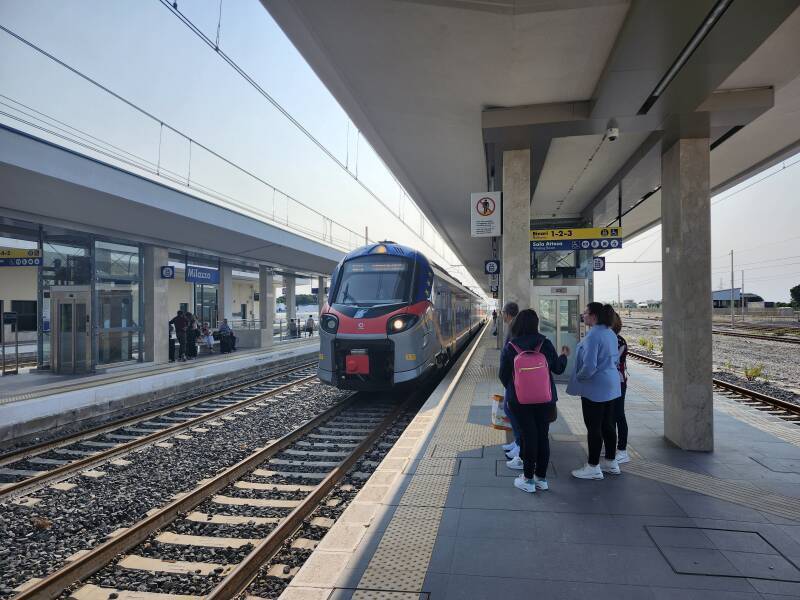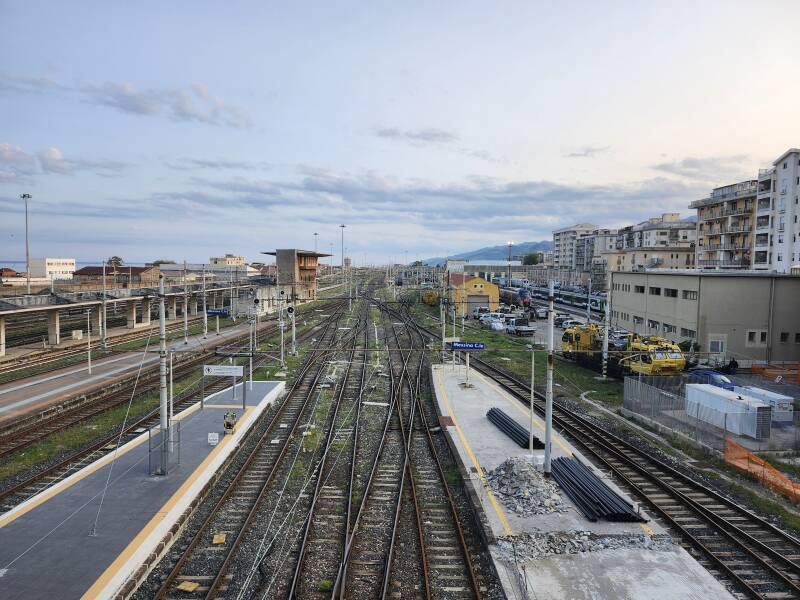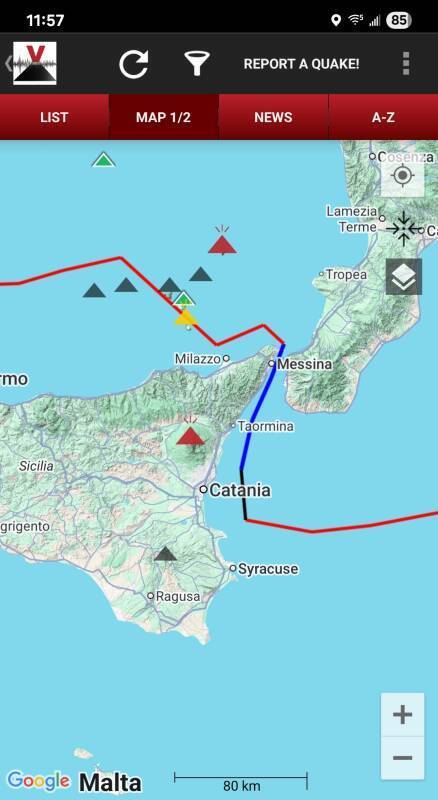
Arriving in Messina
Visiting Messina
I was making my way around Sicily,
and had been on the Aeolian islands of
Vulcano
and
Stromboli.
I returned from Stromboli by ferry,
stopping briefly on Vulcano,
and arriving at Milazzo.
From there I took a train east along the north coast
of Sicily, cutting across the northeast tip of Sicily
through a tunnel to Messina.
Messina and Reggio di Calabria are the major cities
on either side of the Strait of Messina
which separates the island of Sicily
from the "toe" of the peninsula of Italy.

Portion of aeronautical chart TPC G-2B from the Perry-Castañeda Library Map Collection at the University of Texas at Austin.
It's a short trip from Milazzo to Messina on a regional train, only about 20 minutes and € 4.80.

Some of the tracks running south from the Messina Centrale station turn west to go through the tunnel to the line running west along the north coast toward Palermo. Others go to the line running south along the east coast toward Siracusa.

To My Hotel
Guesthouses at Booking.comI stayed at Hotel Touring, only about a block south from the Messina Centrale station. It was a nice place to stay. Touring and not Turing, I saw nothing about the Halting Problem or abstract computing devices during my three nights there.

Up the stairs, and then down the hall to my room:


Apparent antlers on the wall are the in-house Wi-Fi.
My room had the typical pair of large and small beds.

The room had a refrigerator and a television.

There was a small safe in the wall just inside the door. I slept in the small bed, because the large one was visibly saggy.


My bathroom had the standard freestanding bidet and small shower.
The hotel bar wasn't operating. It looked like an atmospheric joint.

To the Strait
A short walk further east on the elevated street past my hotel led to the shoreline of the strait. Looking southeast, to my right, I saw Reggio di Calabria, the city on the mainland. One of the many frequent ferries was crossing in front of it.

Looking northeast, to my left, I could just barely see the strait's opening into the Tyrrhenian Sea.

There has been talk for centuries about a bridge or, more recently, a tunnel spanning the Strait of Messina. A power line spanned it from 1955 to 1993, upgrading from 150 kV to 220 kV in 1971. It was replaced in 1985 with a 380 kV three-phase submarine cable. The two 232-meter steel pylons still stand.
The following aeronautical chart, compiled in 1962, shows the power line as a thin solid black line passing diagonally through the "D" in the "LID34" area.
The problem is that the area is geologically active. The African Plate is moving north, sliding beneath the Eurasian Plate. The two ends of a bridge or tunnel would move with respect to each other.
In addition, the strait is deep and the currents are swift. Homer described Scylla and Charybdis in his Odyssey, and now a dangerous whirlpool near the mouth of the strait is said to have possibly been an inspiration.

Portion of aeronautical chart TPC G-2B from the Perry-Castañeda Library Map Collection at the University of Texas at Austin.

There have been many proposals for a bridge. During my visit in 2025, the government announced that construction would start soon. Its central span would be 3,300 meters long, making this the longest suspension bridge in the world. Concern remains that the Cosa Nostra of Sicily and the 'Ndrangheta of Calabria will insert themselves into the project.
The Man inSeat 61
Trains are carried across the strait on large specially designed ferries. An overnight train runs every night in each direction between Milano, near the Swiss border, and both Palermo and Siracusa. Also two overnight and two daytime trains run daily in each direction between Rome and Sicily. Ferries carry the trains between Messina and Reggio di Calabria. A southbound train is split in half to load it onto the ferry in Reggio di Calabria. On the Messina side, one half continues to Palermo, the other to Siracusa. Northbound, half-length trains from Palermo and Siracusa are connected into a single train in Reggio di Calabra. The Trans-European Transport Networks plan their grand Line 1, a link between Berlin and Palermo. That has increased the pressure on Italy to proceed with the bridge project.
To the Harbor
I went back inland past my hotel, then around the train station and the cross-strait ferry port to the harbor.

In the early evening, the area had somewhat of a recently post-Soviet look in need of power-washing. The sculptural friezes were in what I interpret as Art Deco style.

It was a little more bleak inside the arch.

The fish market was closed.

I went up the tree-lined Viale san Martino. Within the first block I passed a swanky restaurant. So, a little like Bucharest rather than strictly post-Soviet.

Later, I got limon granite at a cafe along Viale san Martino. Granite is finely-crushed ice with flavoring. Lemon in this case.

It was a quiet evening.

I planned to start seeing the historical sights the next morning.
Where Next In Italy?
( 🚧 = under construction )
In the late 1990s into the early 2000s I worked on a project to
scan cuneiform tablets
to archive and share 3-D data sets,
providing enhanced visualization to assist reading them.
Localized histogram equalization
to emphasize small-scale 3-D shapes in range maps, and so on.
I worked on the project with Gordon Young,
who was Purdue University's only professor
of archaeology.
Gordon was really smart,
he could read both Sumerian and Akkadian,
and at least some of other ancient languages
written in the cuneiform script.
He told me to go to Italy,
"The further south, the better."
Gordon was right.
Yes, you will very likely arrive in Rome,
but Italy has domestic flights and a fantastic train system
that runs overnight sleepers all the way to
Palermo and Siracusa, near the western and southern corners
of Sicily.
So, these pages are grouped into a south-first order,
as they should be.